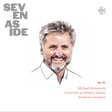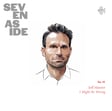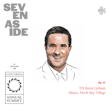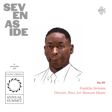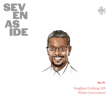Become a Creator today!Start creating today - Share your story with the world!
Start for free
00:00:00
00:00:01

Neil Daugherty
The architect of Teneo's sports practice on the global sport-business landscape and firm approach; the "professionalization" of the ecosystem; the long, historical view on sportswashing; the inevitable drift to quality programming; and humility as a key ingredient in foreign club ownership
Transcript
Emergence of New Consultancies
00:00:05
Speaker
In 2019, New York Times deal book spotlighted a crop of consultancies looking beyond their communications routes and mounting challenges to strategy incumbents like McKinsey, underpinning the prototype on issues and risk sophistication and potpourri of capabilities seemingly purpose built for the era of so-called stakeholder capitalism and radically changing business, regulatory and geopolitical environments.
00:00:20
Speaker
Thank
Daugherty and the Global Sports Landscape
00:00:25
Speaker
Neil Daugherty is a senior managing director of one such firm, Tineo, and an architect of the nascent sports practice that's the progression of a long line of sports work for the firm since its inception.
00:00:26
Speaker
you.
00:00:35
Speaker
It's a proposition to which Dougherty brings not only an impressive sector pedigree, but substantial time on the ground in markets like Doha, where, among other assignments, he advised the organizing committee for last year's World Cup. We sit with Dougherty at a moment when sport, arguably, has never been more of a touchstone for the forces roiling and reshaping the global marketplace. He offers up a wide angle of the sport's business landscape and firm approach.
00:00:55
Speaker
talks the intricacies of institutional capital and quote, professionalization of the ecosystem, gives us the long historical view on sports washing, reminds us that quality wins out in the media equation and that humility is a key ingredient for foreign investors in club custodianship.
00:01:18
Speaker
Neil Daugherty, thank you very much for joining us today. And I'll start with this. You know, we're at this exceptional evolutionary moment for the industry of sport and indeed the marketplace at large. How does the Tineo sports practice meet this moment? And how is an expression of the Tineo proposition? Does it view and approach the world and the business environment?
00:01:38
Speaker
Thanks, Ebon, and I think it's useful to give some context around this before we then sort of talk about how we play within this space and how that routes back to Teneo. Obviously, we're now sort of going back to school post summer in Europe and post Labor Day in the US, but the international sporting calendar is sort of churned on in that time. You know, we've just finished the most successful Women's FIFA World Cup ever in Australia and New Zealand, and I'll come on to talk about some of that in due course.
Recent Major Sports Events
00:02:03
Speaker
NFL season is underway on your side of the pond. We're looking forward to the 50 over Cricket World Cup in India next month or in the earlier rounds of the Rugby Union World Cup in France. And I think sport has never been more popular and more global as live, unscripted entertainment that can compete for people's
Global Media Rights and Investments
00:02:22
Speaker
leisure time. And I think it also hits a lot of buttons in terms of that sense of community belonging and fandom, all trends possibly accelerated post COVID-19 in that
00:02:32
Speaker
they're things that we were deprived of, you know, in terms of live sports events for the best part of 18 months. And I think that has therefore led to an explosion in the value and interest of global media rights. If you look, for instance, at the Premier League last international deal with NBC and Peacock in the US, that's worth 2 billion pounds, $2.7 billion for 2022 to 2028. Remember, we come on talk about this as well. That also includes Spanish language coverage, which is increasingly important.
00:02:59
Speaker
in North America and you're part of the world. That was twice the value of the previous rights deal. And I think particularly this is across a number of different sports, particularly in football or what traditionally would have been called soccer in North America. The bet is that interest is only set to grow ahead of the 2026 men's FIFA World Cup.
00:03:17
Speaker
in US, Canada and Mexico. And hence there's no coincidence that almost all of the Premier League clubs and then Barcelona and Real Madrid have played friendly pre-season tour matches this summer in the US. And I think therefore on the buy side, that's triggered something of a gold rush among US investors in particular for European and UK football clubs. It isn't exclusively around football. It is also around other sports as well. But clearly football is one of the most developed sort of commercial ecosystems around that.
00:03:46
Speaker
So there's a gold rush for investment in clubs and also for league structures and media rights. And on the buy side, and I think what has changed and why Tenayo is really interested in this and why we're getting a huge amount of interest is that that has attracted more institutional capital and private equity funds to what have been traditionally cottage industries of sports and clubs
Shift in Sports Ownership and Investment
00:04:07
Speaker
where you have
00:04:07
Speaker
executives, administrators, owners who are often former players or fans of those clubs and franchises made good. You know, the joke was in UK football clubs that, you know, you could probably add county cricket clubs and premiership rugby clubs to that as well, that they were often owned or funded by the local butcher, baker, candlestick maker or car dealership owner. And these are self-made men and they pretty much were all men with a link to the local area. And that dynamic is obviously changing.
00:04:34
Speaker
And on the sell side then, I think some of these trends have also been accelerated by during COVID-19, these sports franchises, clubs were deprived of two of their principal funding streams, TV rights revenue associated with playing fixtures because they weren't playing fixtures or they were playing fixtures behind closed doors, which made for a much worse TV product. So yeah, they had to renegotiate some of those deals during COVID.
00:04:56
Speaker
And they clearly weren't selling any tickets around live fixtures again, because yeah, either there were no live fixtures to attend or fans weren't allowed to attend because of some of the public health restrictions. And that meant that many clubs that were financially stressed pre COVID-19 are now seeking outside investment.
00:05:12
Speaker
And I think there are some other interesting dynamics there around sort of scarcity value as well whereby US sports franchises very rarely change hands. And we'll talk about that later because US sports franchises are largely profitable, whereas European ones are not. Huge potential upside to go for, but most of them are indeed not profitable at this point in the cycle.
00:05:33
Speaker
And if you look at this, Josh Harris has just literally paid $6 billion for the Washington commanders this summer. And therefore, if you look outside the very top English clubs, Man United, Arsenal, Chelsea, English football clubs can look to be good value for investors on their buy side. By point of comparison, Newcastle United was reported to be sold to the Saudi Public Investment Fund by Mike Ashley for just over £300 million.
00:05:56
Speaker
So the professionalization of those industries is happening with the attraction and inward investment of institutional capital. And that's really led to a demand for better quality advice because frankly, you can't mess around with pension fund money, which is regulated. You really need to be careful around how that is being governed and stewarded.
00:06:15
Speaker
And therefore you see it here on the league and competition side, you've had institutional capital come in from the likes of CBC into Formula One, as well as taking large minority positions in La Liga, Liga, TV rights. They've also forward sold those media rights. CBC have invested in the women's tennis tour as well, the WTA as well.
00:06:34
Speaker
I think because of that, those clubs and leagues are starting to evolve. They've come out of an era of gentlemen amateurism. When they were set up, there were social clubs in industrial communities. In post-industrial Europe, they're still community assets. Unlike in US sports, you can only ever hope to be viewed as a custodian and not an outright owner of a club, which I think is an interesting topic for debate. And that's why there was such a backlash around the European Super League proposal.
00:07:00
Speaker
would have threatened to rip up over a hundred years of sporting merit-based competition in European football leagues. That means that there is a hope within European sport that even the smallest and worst funded team has in theory the opportunity to beat any other team in the English football pyramid on any given Saturday in a cup competition or to rise up.
00:07:18
Speaker
through the leagues and succeed. And the European Super League proposal was much more for a closed league structure, more akin to the US sports league model. And that's why there was such a vermin fan and political backlash in 2021 when that was announced and the proposals fell apart so quickly.
Governance and Capital in Sports
00:07:35
Speaker
So there is certainly an awareness around that institutional capital coming in that they need better integrated, more holistic advice where people can advise across
00:07:45
Speaker
political impact locally, nationally, fan engagement, media engagement, social media, but also then where the commercial upside is. We haven't even touched on women's sport, but that's 50% of the global addressable audience.
00:08:00
Speaker
They're often the gatekeepers and role models to sporting participation in families. There is just in the foothills of development as well. If you look at the FIFA Women's World Cup, $570 million in global revenues may achieve break even with that in terms of putting the tournament on. That was the first time FIFA had ever sold rights to the women's tournaments as a standalone entity. The statistics are really impressive given that we're right at the start of the development of women's sport. But the kicker for me around all this is all about potential upside because
00:08:29
Speaker
If you look at the European sporting model, only seven of 20 Premier League clubs posted a pretext profit last season. You can probably put Manchester City to one side. They are funded by UAE sovereign wealth fund money. They've got 105 outstanding charges of financial fair play breaches with the Premier League, which I should add they are contesting. But that leaves a small rump of clubs like Brentford, Burnley, Brighton, who are profitable. And football doesn't really have a revenue problem. It has a cost control problem.
00:08:58
Speaker
If you think about other businesses, no other business in their right mind would spend 90% of revenues on employee wages, but that's exactly what Premier League football teams do. And for all those problems that I've outlined in terms of the sell side and the underlying profitability dynamics that they have,
00:09:16
Speaker
You've also then had the sort of short term sugar rush injection of Saudi capital with a restructuring of their leagues into European football, where you've had players in the peak of their careers like Ruben Neves go from the Premier League to the Saudi
Diversity and Inclusivity in Sports
00:09:30
Speaker
league. You've had a bid come in, whether it was posturing or not, we could discuss, but of $150 million for Mohammed Saleh to go from Liverpool to the Saudi league, for instance. And that is really masking some of the underlying structural problems within European football.
00:09:44
Speaker
And if you go just drop down one division lower, so the championship, all clubs within that division are loss making, and yet people will still invest because the upside of getting into the Premier League is significant. And I think that's the big dynamic in Delta with US sports, which are closed leagues with no reputation risk or financial risk around relegation, and a college draft system to support them, which creates a more equitable
00:10:09
Speaker
access to younger players and a chance of winning next season. You've had a terrible season the previous season. So you look at most US sports franchises, they are profitable. And certainly when we talk to US investors, even really, really smart people with really smart money behind them, they do struggle to get their heads around the difference between the sort of underlying dynamic of risk and upside between European sport and US sport.
00:10:31
Speaker
Really, that's where we come in because we can advise across those complex, interrelated audiences around fan engagement, media, social media, political and regulatory landscape, investment case, governance and talent. Do you have the right people in place once you've acquired an asset? Are you, as an owner, fitting proper custodians of those clubs?
00:10:51
Speaker
Do you have the right skill sets in those teams to support the new growth opportunities and reach new audiences? Do you have the right recruitment and perspectives whereby you are taking views that aren't inside baseball, if you like? And then we're doing a huge amount of work around advising a lot of sports, structurally becoming more diverse and inclusive.
00:11:10
Speaker
And that's not just across the commercial opportunity for women's sport, but also around being anti-elitist, being anti-racist, et cetera, as well. Having done a lot of work in cricket, for instance, which I'm more than happy to come on and talk to you about as well. And never has that been more topical with the current travails of the Spanish Football Association and the prolonged public
00:11:31
Speaker
resignation process of their president following the alleged, well, she's taking the charge now of a public sexual assault on Jenny Hermoso, one of their star players in their Women's World Cup win. I think there's a lot to talk about there. We've had a huge amount of experience in this space over a 10, 15 year period. We probably have never had a formal rapper around our sports work. We now talk about our strategic sports advisory work, but personally, I've worked
00:11:57
Speaker
Over 10 years, I worked with the Qatar World Cup Organising Committee. I worked in and around London 2012 Olympics when it was here. I've done work in the past Premier League and kick it out with the leadership of the England World Cricket Board, World Rugby, RFU, and then a number of different Premier League football clubs we're working with and potential owners and investors in that space. It's a fascinating time to be involved in this, both as a fan and somebody who we can bring professional skills to bear that I think are certainly needed by these industries at this point in time.
00:12:24
Speaker
So your client makes investors, leagues, clubs, federations, governing bodies, so forth. I mean, it's a bit of a balance of all these different stakeholders. Yeah. One of the things I would say is because they've been cottage industries, I think possibly at the very top of those organizations that they share insights and they talk.
00:12:44
Speaker
and they share experiences, but they have run in parallel as quite separate verticals. I don't think historically cricket would have learned that much from football or football would have learned from tennis, but I think that's changing because you're getting a sort of professionalization of the executive leadership of those organizations.
00:13:03
Speaker
who are being drawn not just from former players within those individual sports and people are circulating through now as well as I think there is a real development of a sports business industry. And again, that is because the quantum of money involved in terms of media rights and institutional capital is so much greater.
Professionalization and Audience Engagement
00:13:21
Speaker
And that's really happened over the last 20, 30 years. So I think there's sort of professionalization of executives. I mean, there's professionalization of advice, whether that is coming from
00:13:32
Speaker
lawyers, financiers, boutique investment houses who would advise around the structures of some of these deals, the likes of us on the reputation side of things. So I think it is really changing in that respect. Growing up, and that probably is
00:13:47
Speaker
Change can be scary, particularly for some of the constituent parts of those ecosystems as fans. I am a fan, so I get that, but also there's opportunity there as well. Think about the corporate piece in particular, and that is one area that I'd not touch on was corporate investment sponsorship and what have you. Do you find that there is a different mentality? Is the makeup of the room and the client mix any different for these conversations?
00:14:08
Speaker
I would say that increasingly you're getting at the people who are at the top of these organizations who come from the media rights holder rather than owner side. And by that I mean broadcast partners because those have been the people who have effectively packaged, marketed sport and reached new audiences over the last 20, 30 years. If you think about
00:14:31
Speaker
the advent of pay TV and the importance of the development of Sky, Comcast and others of live TV sports. So I would say that the people now at the top of sports on the executive side have come from that commercial background because actually they know what the broadcast partners, what the media partners are looking for and how to package up
00:14:52
Speaker
sports create format innovation. Effectively, this is competition for eyeballs, competition for attention has never been as great. I don't buy the sort of Florentino Paris argument at Real Madrid that children can now concentrate for no more than 10 minutes and therefore everything has to be a reductive format of a sport.
00:15:11
Speaker
to fit that attention span. But it is clear that people have got more leisure time across the world, despite current economic downturn we're going through. If you look at across the world, there's a growing global middle class with more leisure time, more competition for that leisure time, more choice. They don't have to watch cricket. They don't have to watch football. So how are you making your product as appealing as it can be to reach that
00:15:37
Speaker
group of people and to give them a sense of community and access to your sports franchise or league. And I think that's where it is interesting. So we've had some interesting developments in UK, for instance, with the evolution of the hundred, which is a form of franchise cricket, which has been extremely successful, particularly in accelerating the development and commercialization of women's cricket.
00:16:00
Speaker
You're seeing now new forms of tennis in terms of participation, whether that's pickleball in the US or Padel in the rest of the world. Very interesting because certainly tennis in Europe has a history and background, a perception of being quite elitist, quite difficult to get access to tennis clubs, get access to tennis coaching. Padel is an intergenerational sport and there are many whereby you could actually literally play with your grandparents.
00:16:27
Speaker
you don't need as much space to have access to it as well so and i think if you look at the sort of involvement of the likes of being sports within padel and commercializing that this real upside there so i think there are.
00:16:41
Speaker
new forms of traditional sports or new sports that are cutting in on this territory. And obviously, I think for the first time, we've been here possibly on the cusp of it at some points in the last 40 years, but certainly football or soccer breaking the US as well. You talk about this new type of decision maker in these these organizations historically have not necessarily associated geopolitical risk with the sensibility.
Political Risks and Sponsorship in Sports
00:17:07
Speaker
And so you talk about the holistic approach and we've spoken
00:17:11
Speaker
with several of your colleagues for this series. Previously, Kevin Cajuarov to nail risk. How functionally or philosophically does a specialization like political risk integrate with the sports practice?
00:17:23
Speaker
Of course it does. Sports is global. Yeah, it's a global TV viewership. It's a global social media viewership. Fandom global support for clubs, whether they're Manchester United, Liverpool, Real Madrid. There's a local fan base. There's a national fan base for these teams. And then you will have loyalty from fans who may
00:17:44
Speaker
never get to go to the Santiago Banabeo or to Old Trafford. Or they may go once in their lifetime and that will be a defining moment in their lives for them, but they would still describe themselves as a Man United or Real Madrid fan.
00:17:55
Speaker
And then also, you can quite easily misstep. You've had that with WTA within China, for instance. And again, by not understanding how something you might say in one part of the world will be received in another before you say it, you do potentially alienate a government
00:18:14
Speaker
that can choke access to a large part of your viewership and your events program. So of course that is important. And also increasingly these organizations are going to market either as leaks within collective bargaining or as individual clubs for new categories of sponsors within different geographies. And they have to go in being politically aware in terms of the political climate there, the political risk, but also the potential upside
00:18:42
Speaker
And I do think as well on the principle of no surprises being forewarned when China is the most obvious example because of the sort of command and control nature of that economy. If you asked where the hosts for the next FIFA World Cup were going to be in 2016, most people involved in the football business would have said China.
00:19:04
Speaker
in 2030. And then there was a huge influx of Chinese capital into Premier League football clubs, some championship clubs, the two Milan clubs in Syria are. And then there was a decision centrally within China that actually there was a change of policy and that suddenly that capital and support for those clubs was withdrawn. Now, if you didn't see that coming, then you'd have a problem. And you can argue that that is exactly what's happened with the two Milan clubs that have
00:19:31
Speaker
passed through several sets of ownership now to get to the point where they're at. So of course, if a butterfly beats its wings in Beijing, you will see repercussions in different places in the world.
Media Influence and Geopolitical Factors
00:19:43
Speaker
And I think sport is no different than other industries in that respect. It has a huge profile and viewership that is probably disproportionate to its size as an industry or the market capitalization of the very few clubs and leagues that are any element of their share capital publicly listed. But you know,
00:20:01
Speaker
They sell newspapers, they drive eyeballs, they drive social media interactions, they drive TV subscriptions. Relatively speaking, it's still not a big industry. Someone fascinated by this issue of, quote unquote, sports washing quite salient these days. And I'd be keen to get your perspective on this as someone who has spent substantial time in the Middle East and Doha specifically. What do you make of the claims of sports washing? And as we're talking about geopolitics among Gulf States, especially by Western critics and
00:20:27
Speaker
When you think about World Cup guitar or consider Saudi's Vision 2030 blueprint, which of course is so much more than about sport, do the claims in your view ring accurate? Do they tell the whole story? You're not going to tell the whole story in two words, sport-swashing, which is a nice phrase. But if you take a long historical view on this, back to my point around
00:20:48
Speaker
local butcher, baker, candlestick maker who would have sponsored a local sports team in Victorian England. By and large, they weren't doing that out of the goodness of their own heart. Some of the religious groups were, but it was a random light in self-interest, right? So that was very early ESG promoting your local family butchers in Manchester, for instance. I think it's nothing new.
00:21:11
Speaker
There's an emotional connection that people have with sports teams. And if you play that well and you deal with sensitivity, understanding that you are not the owner of a team when you acquire it, you're a custodian of it, that's fine. And I also think if you accept that football should go to new markets and you accept that
00:21:32
Speaker
There is a young and very football-mad population within the Middle East more generally. Why wouldn't you put a World Cup in the Middle East at some point? And geopolitically, when that was bid for, Qatar had the money, it had the resources. There weren't many other places that were sufficiently stable within the Middle East to have hosted the World Cup. Countries want different things from hosting sporting mega events as well. And Qatar's ambition was to put itself on the map globally.
00:22:01
Speaker
given it isn't a pretty insecure place in the world. So that if anything did happen to it in terms of political insecurity, it would have partners in the world who would care about it. And I think they need also something as a catalyst to accelerate their own national vision and the development of their infrastructure, the legacy of sporting participation in that part of the world.
00:22:25
Speaker
acceleration of women's rights, all of these things would have happened anyway, acceleration of workers rights as well. And clearly that wasn't perfect. But equally, you have the ILO in Qatar, you have a minimum wage in Qatar, the way that you don't in other Arab countries. And that wouldn't have happened without the scrutiny of hosting an international sporting event of the scale of the World Cup. And it wouldn't have happened in the same time scale because there is power in a deadline.
00:22:53
Speaker
the world showed up in November 2022 and they had to be ready to host the party. So I think there is a value to this.
00:23:01
Speaker
Would you say that there is the same capital available to support these events or economic, cultural, political value from hosting them for more established, developed societies in the West? Probably not. I mean, you can see that with the recent issues around the Commonwealth Games not being able to find a host for the next edition, for instance. So countries want different things from hosting these events at different times in the development.
00:23:26
Speaker
And I would say probably Saudi Arabia wants something similar in its joint bid to host the 2030 World Cup as well. Yeah. Is it the same consideration as Germany hosting Euro 2024? Of course it isn't. Is it any less valid? Let hear who's perfect cast first though.
00:23:43
Speaker
Kind of in a similar vein, you know, we're looking to UNGA, UN General Assembly, and we just wrapped a G20 that spoke boldly to geopolitical and economic realignment, which is a theme and dynamic, as you point out, echoed in sport at Mohammed bin Salman in the conference of the Middle East, the New
Tineo Sports Market Opportunities
00:24:00
Speaker
Europe. If Teneo Sports could open a dedicated office anywhere in the world right now to be on the front lines of a market opportunity, where would it be?
00:24:07
Speaker
I think Miami might be a pretty good place. I'm not just saying that because of the tax climate and the weather. It's obviously where FIFA are going to be headquartered for the 2026 World Cup. I think it's also a good bridgehead into South America, which is obviously sports mad as a market, has its own political challenges, but as a huge addressable market. You have to see that in fact, that 40,000 Argentinian fans travel to Qatar 2022, partly subsidized by their
00:24:34
Speaker
government, but I think that is, for a country experiencing economic turmoil and hyperinflation, which has been on and off for the last 20 years, that is a huge commitment. Clearly the Middle East as well, question mark around whether you have to be there to serve the market. I think to an extent you do. I would say having set up an office in Qatar, would you want to set up an office in NEOM right now? Probably not because it's not built, but clearly we do service some of those clients in and out of Riyadh and my colleagues in Dubai as well.
00:25:01
Speaker
there is a huge global opportunity, certainly North America, South America, and the Middle East in due course. But the opportunities are slightly different as well. North America, South America is about a huge captive market for actually attending live sports events. Whereas the Middle East, Saudi is one of the most populous countries in the Middle East, population of 30 million, very young population engaged in terms of
00:25:26
Speaker
attendance at sport, they need to transform that into participation in sport as well, but it's still only a population of 30 million people. So actually their opportunity is to use that diversification of their economy and sport as a catalyst to achieving that and development of infrastructure as well, rather than necessarily as a way of serving and entertaining a captive market of billions of people.
00:25:51
Speaker
I have here written, you can't say Miami, by the way, because that was my, it's such an, an alluring proposition. If it's good enough for Lionel Messi, it's probably good enough for the likes of us. I'm glad you bring up Messi because I'd like to touch on the media equation in one particular point you brought up earlier and that of original
00:26:09
Speaker
non-live broadcast programming, both scripted and unscripted.
Content Oversaturation and Quality
00:26:12
Speaker
In its latest earnings call, Netflix stressed emphasis on original content over live sport, which the labor strikes notwithstanding, was hailed by some of the industry as brilliant strategy. There seems to be this persistent mentality in the US especially that more is more as it relates to sport content, even when recent history shows that's not remotely the reality.
00:26:33
Speaker
I wonder if we risk hitting a saturation point, peak content, if you will, that does a disservice to the broader agenda for these clubs, these leagues, and what have you. Not everything can be drive to survive. Not everything can be rexum. Do you have any thoughts on this, on a measured approach as opposed to going all in on content as knee-jerk strategy?
00:26:54
Speaker
I think if you take a step back, you know, sport is an entertainment property. I think it's unique in some respects, but in others it isn't. And you highlight successes, Drive to Survive, Formula One would be one. I think the Australian cricket team behind the scenes documentary is extremely good as well. But the point is, you know, there's a very few films that win Oscars each year.
00:27:15
Speaker
And very many stuff films that are produced that don't grow very much in the box office that go straight to streaming platforms and aren't watched. So the important thing is the quality of premium content. And I think there will always be a drift to quality. So there will be a market for quality in terms of the best live sports and live sporting drama.
00:27:39
Speaker
and people will have a demand for the best behind the scenes content. I think the problem is that you had some trailfinders around Drive to Survive, Last Dance, and suddenly we need behind the scenes content. I think there's probably quite a small market, for instance, for a 12 part Amazon series about Jose Mourinho at Tottenham. You'd have to be a pretty hardcore Tottenham fan to sit through all of that. I think it was pretty hard watch
00:28:05
Speaker
watching his team when he was manager there as well. And I think that's the point. There will always be a market for premium, best in class content. Those who can't provide that are going to struggle. And you do wonder about some of the pay TV services, streaming platforms who don't have that, the likes of Duzone. We've had different sort of iterations and generations of platform around this, where people have thought that they can get into sports
00:28:32
Speaker
broadcasting by having not the best quality content. And they really struggle because unless you're best in class, people are not going to pay for that subscription. So yeah, we can go back to Satanta within the UK TV market 20 years ago. There are others who've come in and tried to chisel their way in on the market incumbents.
00:28:51
Speaker
And you really do need, primarily Barcelona, Real Madrid, you need Formula One, you need the top tennis product. Otherwise broadcasters are not prepared to pay for it because the audience just isn't there. Well, for all the other storylines, relatively little is made about the flood of American capital and international football and potential sensitivities that come with it.
American Capital and Cultural Dynamics
00:29:11
Speaker
And to be clear, it's not only about the money, it's about a distinctly American flavored form of capitalism.
00:29:17
Speaker
As a Brit and fan of sport first, how do you view the influence of not just money, but the American business mentality on something so tied to the English identity, something with such cultural and civic importance? And furthermore, how are you counseling clients around these sensitivities?
00:29:34
Speaker
We have the advantage of being on the ground and like clearly we can't credibly be fans of 92 football league clubs, but we do understand that interrelation between local political audiences, fans, media, how they interact with each other on social media.
00:29:50
Speaker
what is happening in terms of a tightening regulatory environment as well, which is as a result of bad owners and not bad US owners, just bad owners of clubs like Barry Macclesfield that have gone into administration and then prisoners Phoenix clubs from the flames, as well as the reaction to the European super league, which was done entirely without consultation or without regard to that history. And yeah, the fact that people will have
00:30:17
Speaker
personal emotional ownership of a club, even if they don't own the share capital. And I think we're getting a more sophisticated type of global investor and clearly a lot of them are coming from the US because that's where the pools of capital are, who do increasingly understand that and that bring in local executive teams as well.
00:30:34
Speaker
Rexham is the one that is the poster child for this, but they have, as well as having Hollywood frontmen for an owners, they've kept quite a experienced local management team who understand how to run and operate a lower division football team. You have good owners such as John Berylsson, who passed away sadly in a car accident this summer at Millwall. And there are people that take the time to come
00:30:59
Speaker
listen and engage with the fan base. I can say this as a season ticket holder in Millwall, it's not always the most lovable fan base. It has a very particular place in that community. And if people listen, as in any business transaction investment, they are prepared to take advice and weigh that advice.
00:31:17
Speaker
And of course, you can professionalise from the outside, you bring different experience in, but you have to realise that you are dealing with something that is extremely precious and valuable to those people who effectively have supported that club for generations and put their emotional and financial capital behind it. And that club exists to serve those people as well as new audiences. So I wouldn't see it as
00:31:43
Speaker
bad US owners and good UK owners. I would say that there are bad owners and good owners. And it starts with engagement, transparency, listening and a degree of humility.
00:31:57
Speaker
Well, finally, you know, as we look to World Cup 2026, which will be a sprawling event, US, Mexico, Canada, we could be in a very different political climate here in
World Cup 2026 Opportunities and Challenges
00:32:08
Speaker
the States. Certainly Mexico will have a new president. What are the issues that are most salient to Tineo Sports as you look to the tournament? How are you positioning Tineo Sports? What are the opportunities that you see and what's your outlook for the next few years?
00:32:22
Speaker
So clearly it's going to be a very different tournament to the last one. The last one was a compact World Cup, Middle East's first World Cup. It was a family friendly World Cup, optimum TV viewing, schedule times, globally. It's a very different proposition within the US. And I think a lot of the character and culture of the tournament will be driven by the host cities as well, which are obviously established
00:32:47
Speaker
host cities with established sporting venues. And there won't be that requirement for that much of an upgrade. So I think that that helps in terms of some of the environmental story and less embedded carbon from building new tournament and training facilities. Although clearly the travel for fans, teams, officials is going to be offset and it will have a different flavor and
00:33:09
Speaker
character for the tournament. You talked about the geopolitical element as well. I'm sure if Trump's returned, you may not be building stadiums, but you might find yourself trying to build a wall as well, which would be interesting when it comes to co-hosting a tournament with Mexico. So I think it will have a very different flavor. But actually, if you look historically at the groups of fans who have over the last two or three World Cups traveled in numbers to World Cups, they've come from South America. They've come from
00:33:33
Speaker
the US, even when the US national men's team haven't qualified, by the way, they've come from the US. So it is right at this point in time that the US hosts that. And I would hope it is a catalyst to further development of the grassroots game and of course the women's game as well. And the good thing about the US is when it invests in sport,
00:33:54
Speaker
It has the established infrastructure in terms of the college system there to really accelerate sport. And clearly the dynamics of the US population is that it's also becoming more Hispanic as well. So the challenge potentially is for some of the traditional US sports to regenerate, renew their own support base. I'm talking about baseball. I'm talking about American football as well, which are clearly massively profitable. But then if you look at the viewership figures and the people that attend those sports, you know,
00:34:22
Speaker
they're not getting any younger, which is one of the challenges also the Premier League football has within the UK in terms of access, ticket prices, how are you reaching a younger audience and making that more accessible and intergenerationally renewing your support base.
00:34:38
Speaker
a great note on which to end it. Certainly hopeful, but also with a note of caution and just good perspective all around Neil. Thank you so much for this and all the best. This episode of 7 Aside is one of a special run produced in partnership with Concordia for Concordia's annual summit in New York City.
00:34:56
Speaker
All sessions from the 2023 edition of this foremost global convening are available on demand, as are details for upcoming Concordia programming, including its United States Summit in November. All can be found at www.concordia.net. Signing off for Kit Magazine in Santiago, I'm Evan Howell.





